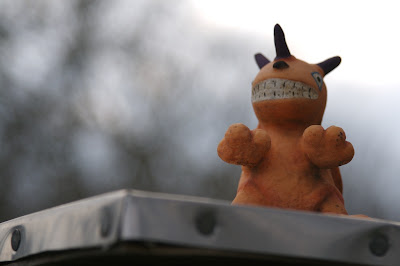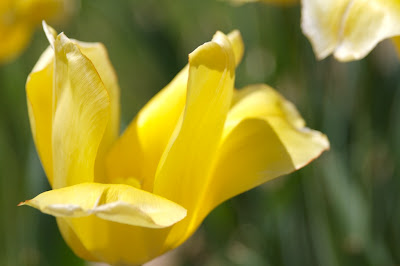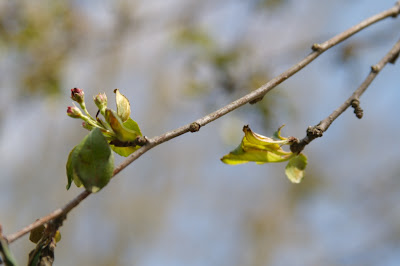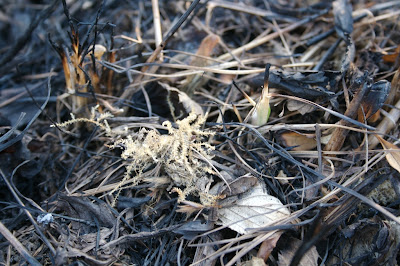The blooming we're going to get.
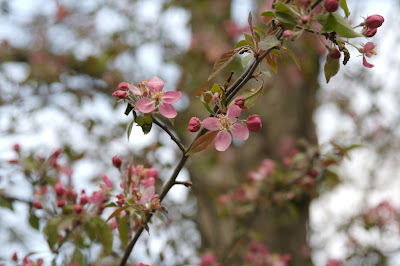
I'd say it's been an uncertain spring. But then again, what spring is not? Or what season, for that matter? I think to the joyous uncertainties of this time last year and might wince were it not for the fact that, as my flaming-sworded friend says, I wouldn't have seen what I saw had I not been (and were I not still) on the lookout for something. I'll paraphrase myself: it's a wonderful ferocity I'm waiting for. So this year is a bit more subdued than last. I trust that the ecstasy will return.
Here's a hint. Is there someone in your life of whom you think enormously highly, and does that person know how (and why) you feel? (I'm not talking about romance here, or not just about it. I'm talking the myriads who [d.v.] fill your life, all the affections that make you, even in their evanescence.) Write it down. Hand it over. This week, I've been marveling at the courage it takes--and creates--to notice another person and to reveal that someone's noticing, that attention is being paid. The noticing doesn't always get recognized or accepted: I've learned that much, and I too have been the culprit of non-acknowledgement. But when it does. Oh, when it does. So try it. Try the recognition. Start the volley.
No, no, don't do it.

At the doctor's office, every couple of years, I recount my medical history and wonder why I have to go back through all those gone years, all the things I checked off and explained the last time around. I don't worry about internal coherence; I feel certain that I lay out a slightly different list each time around. This year, the form seems to ask for data differently, but even that thought might be my memory's playing tricks on me: it's been that long since I had the doctor look me over, check me for wear and tear. Mark conditions you have had, the form requests. Mark with a C if they are current. Otherwise, mark with a checkmark and list the age(s) at which you experienced these conditions.
Somehow, these instructions go missing as I skim over column after column of symptoms and illnesses, all mixed up with no sense of order; things that are ongoing do not get marked with C, all conditions getting checked one by one. Somehow, this time, it's "thoughts of death" that slows me down, slows me down a lot. At what ages did those thoughts crawl in between my ears and prod me in my hectic silence? Is there a danger in admitting them now? Will I see a pattern when I put down the numbers? Will the doctor see a pattern I cannot see? It is too much to figure out in this windowless room, too much to figure out while I perch on the edge of an exam table wearing just a disposable gown and sheet. I think back through the years, do the math, come up with the ages. 18. 25. 27. No pattern. No recent recurrence. And now: only gratitude, in so many directions. When he reads my form, the doctor remarks nothing: no doubt those same numbers are on the last blue form I filled out, and no doubt we talked about them the last time I produced my medical history through checked boxes. But oh, the unexpected review, the glance back for which I did not prepare. The form's six words cover nothing of the feeling, make it sound even to myself as if I had actively plotted, when I did nothing of the kind on any occasion. There's been no time to write in extra qualifiers, to protest "passive ideation only." There's no need, in any case. He sees me sitting in front of him, very much not fallen out a window or off a bridge, very much vital and alive. This is what matters. No question, end of story.
I can't remember a time when a vaccination left me hurting. But in the evening, my right shoulder starts to feel as though I've been lifting weights too vigorously, when in fact I've been lifting no weight at all. Whaa... ah, the tetanus vaccine. A fascination: one fluid into one arm, another fluid out of another arm, scrapings and probings and listenings. My body checked and tuned up for another few years.
In my dream, a strange woman is wounded, and my friend and I find her beside a road. She mumbles to my friend, "I don't mean to take you away from your wife." He lifts her to her feet, then drapes her over his left shoulder. When he takes my left hand in his right, I realize that she has meant me. I am his wife. Only, even in the dream this is a mistake. I am not his wife; he has no wife, in or out of this dream. Still he presses me to his right side and we walk down a road together. Even in the dream our palms sweat, our sides warm and dampen. Soon the strange woman is gone, deposited somewhere she needs to be, and we are in an art museum. Still he is holding my hand and I am holding his, and I do not know which of us most thinks that we should not be doing this, that it should probably stop, that neither of us will be the first to move away. Still we cling, though more and more lightly as time shortens. Still our palms are sweating.
In my next dream, I am meant to be teaching students about free indirect discourse. I am meant to have left them notes, handouts, appropriate passages. I have instead skimmed non-representative sections of books I read in college and graduate school. I have looked only for marginalia reading "FID." I have found passages that will only confuse them. I have skipped town anyway, leaving them with only an inappropriate and vague introduction to a crucial narratological concept, one that opens doors to understanding a slew of major novels. Free indirect discourse haunts me. I begin again and again to explain it to my traveling companion. I am continually interrupted, interrupting myself, losing my way. I need textual passages in order to explain FID fully. But I have carried no books on this journey.
I found the dragon with his head in a gutter pipe yesterday evening, and for the second time in the day I got down on a lawn to take a picture. Later, while I devoured yet more Battlestar Galactica in an almost embarrassing way, the rain started, and I could hear it because the weather is warm enough (at last) to leave the house's doors open. It came first as a slapping, almost an unplaceable sound, until it picked up and became a storm. This morning I wonder whether the dragon will have flushed out onto the lawn, knocked back end over end, or whether he will simply have gotten a good night's cleaning.
How to turn a child into an airplane.
Before you ask permission, you should have a plan. Your plan need not be much more than a secure, stable hold and a basic flight path.
Before you make a plan, ascertain the child's fitness for flight. Does the child seem sturdy and resilient? Does the child seem easily spooked? Does the child seem to trust you?
When you ask permission, take several steps. Would you like to be an airplane? is a good first question. May I pick you up? is a good second question.
If the child says yes and yes, give him advance notice before flight. A basic countdown will work.
No airplane can fly without wings and an engine sound. You need not provide these things; you will provide the lift and maneuvering. Ask the child to practice his engine sound. Remind him to keep his wings outstretched.
After take-off, monitor your small new airplane with great care. At the first sign of trouble, bring him in for a soft landing. If there are no signs of trouble on the test run, come in for a landing and check over all flight equipment. When he tells you he's ready to fly again, start a countdown if you feel able.
When the time comes for a rest, tell him the engine needs to recharge for three minutes. Make three minutes last seven.
When you and your airplane have gotten more comfortable with one another, experiment with fancy flight patterns. Small dips and soars will thrill your airplane. Do not attempt a barrel roll with a plane you've made from someone else's child. A tailspin will thrill your plane. Avoid crash landings. Protect your plane's propeller at all times. Do not force him to keep his wings spread if you fly him in modified loop-de-loops. (Always modify your loop-de-loops.) Explore your territory. Find new territory. Visit the fireplace in the corner of the yard. Search for more dandelion seeds to blow around. Avoid the broken glass you found on your first reconaissance mission.
Return to home base between flights. Make a thirty-second countdown last three minutes.
When your airplane's mother wonders how you've managed to transform her child, offer to teach her how to do it herself. Encourage her when she traps one of his wings on the wrong side of her arm. Remind her that no airplane can fly without wings and an engine sound. (Do not tell her the story about the time you swung a child around by his ankles and he, laughing hysterically, wriggled and then fell out of your hands. Your hold was neither stable nor secure that time. You know better, half a lifetime later.)
When your airplane returns to you later, ask him if he'd like to be a train. Take turns being the caboose.
Do not let him try to turn the dog into a horse. The dog cannot give permission. The dog will not neigh.
When your airplane must take his leave of you, hug him goodbye. When he (exhausted) protests against leaving his pilot, welcome him to the human condition.
Know that you will probably never see your airplane again. Know that he will remember you, if at all, as only an arm across the chest and an arm across the legs. A tight hold. A swift dip and fast turn. A lifting off of the ground and a rushing of air. A pair of black-shod feet pounding over green grass. A reminding voice in the ear: Don't forget your wings. Don't forget your engine.
(That's last Wednesday's tree: what a weekend of warmth will do. And I passed my review. Now, onward to tenure.)
Bat your eyelashes at the tollbooth worker.

It was with no small wryness that I noted my horoscope's recommendation regarding tollbooth workers yesterday morning. Tollbooth workers? We don't even have a stoplight where I live. And the last time I used a tollbooth in anything like my daily life was when I lived in Rochester. I will admit to having fallen for the glamour of racing up to the booth, taking my ticket and grinning at the attendant, and then racing off; this sequence of events was most enjoyable on high sunny Fridays when I was zipping back to Ithaca for the weekend.
Today looks to be one of those high sunny days, but there are neither tollbooths nor tollbooth workers between here and Lexington, between me and my friends and their almost-born. Maybe I'll bat my eyelashes at something else.
The day's quiet.

It wasn't at all a quiet or contemplative day, though now I'm feeling as though it should have been. Or at least more so. Instead it was a day of flurry and chat, of earnest assertion and wry remark, of work barely begun before interruption's arrival. A day of living aloud, rather than to myself. But, in the background, the musing, alone and with others, to ourselves and to anyone who could hear. Not least on the juxtaposition, once again, of beauty and pain. Not least on what we do not know, and what we cannot, and how fragile that makes and leaves us.
Suspending.

A squirrel curled lightly over a branch outside my office, dangling his tail and sleeping. In the afternoon, in the sun. Everyone I know was drowsy today--everyone here, everyone there, everyone everywhere. Everyone else I know was tetchy and irritable. A woman took a cell phone call at the bookstore and, minutes later, ripped the back room's silence with a sob and a promise to go somewhere as swiftly as she could. This afternoon, I closed my office door for the first time in weeks, curled lightly over my book, and did not sleep but did not do much waking either. But now I am awake, because it is not the afternoon, because we have turned from the sun again.
Some key parts of my near-future fate will, apparently, be decided more or less before the month is out.
Oh, love, wherever you are, I am missing you. I am one of those gaps in the light that a tree's silhouette at dusk makes. It is not a soft thing.
But then again, there is the sky, and there are those stars. And that moon both horned and fully visible, if shadowily so. And those are no small things.
Speaking in music.

It's been a presence-heavy day for me today: an early-morning (read: 11 a.m.) rendezvous with a film crew (for my college's new capital campaign video, whose theme, I was told, will not be "We need your money") and a two-hour radio interview and guest DJ spot with an excellent student who runs a show called "Interdiscipline and Punish" on the college radio station. This interview/DJ experience was supposed to happen in January, but the station's transmitter was broken for months and has just gone live again. Once upon a time, I was a co-host for an opera show on this same radio station, but I was so microphone-shy that I almost never spoke. To my delight, I am no longer microphone-shy at all. Perhaps I will train as a DJ and have my own show after my fellowship year is over.
As I began trying to convince my excellent friend that she and I would be kick-ass co-hosts of the coolest radio show around, she put the Hidden Cameras's album Awoo (2006) into her stereo and started me rocking out. You must try them: go here. Anyway, I predict that she'll decide she's up for it.
Have I mentioned that my newest colleague has me hooked on Battlestar Galactica?
Can I express my great dumbfoundedness in the face of this abomination? I mean, watch it: the Lake District is a contender for most beautiful landscape I've ever seen. But also beware. It might hurt your eyes, this video.
In the morning sun, a (real-life) squirrel cleared a six-foot jump from gutter to branch. I watched him run to the edge of the roof, hesitate, and then fling himself toward the tree outside my office window. Such a headlong flinging. There was no way not to love its absurdity, the success it should perhaps not have become.
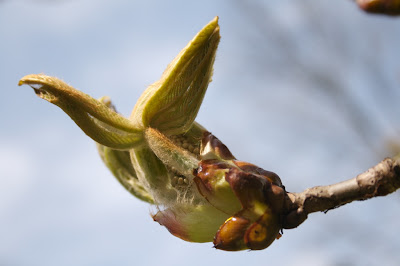
Can I tell you that though I didn't love every moment of reading The Diary of Alice James, I wasn't disappointed? I will confess that I cull moments from works and then carry them with me willfully out of context. Such as:
But what of the success made up of all delicate shades and subtle tones, that makes no sign, but is known alone to the bosom that attains it?--that floods the mind with infinite delight when least expected--that has never mistaken pleasure for that shy bird happiness whose song is only to be heard of the ears of the soul.--Surely it has not sunk deeply into the mind of Man that--The Kingdom of God cometh not with observation: neither shall they say, Lo, here! or Lo, there! for behold, the Kingdom of God is within you. (15 February 1890)But now it's on to the Brownings' love letters, and it doesn't get much better than that, really. This is the thing for which I'm looking, this boldness, this stripping away of the unnecessary, the fretsome. This exclamatory meeting. I know better than to try to live another's narrative. But to live in one for the duration of reading: that seems permissible.
I do have images for tonight's writing, but Le Bloggeur is refusing them, giving me nonsense explanations that resemble "an error was made." Perhaps later. [Hooray! Fixed!]
Oh, and a postscript, because we haven't had one of those for awhile: somehow it didn't occur to me until two days ago that the outcome of my year's faculty review should be revealed to me sometime this weekend or shortly thereafter, as our Trustees are currently wending their ways to campus. Here's hoping for a celebratory weekend (or shortly thereafter). For now, I have one more thing in the air.

Another wait.
I walked home in the silver hour, everything a shade of blue or black or grey, everything not glowing but glown. It was neither dinner nor dessert, neither time to begin again nor time to sleep for the night. Neither light nor dark. Neither solitary nor companioned, neither settled nor slipped. What is this threshold? How long this liminality, this pause?
The dogwood and the maple face off over the house.
In the wind my rescue is.

I often fear that I just don't have a head for poetry. But I do love to keep lines of Ammons--like this one from very, very early in his career--running in the back of my mind, especially on days like this one. From my bed this morning, before I put my glasses on, I watched the far shade flicker like a lamp on fire, our day's high winds gusting clouds and blinking the sun on and out and on and out. Though I had imagined myself perched in the photo lab by 9 a.m., playing Hem songs quietly and spotting out the imperfections on my project prints, the morning took a bit longer to get started and was a bit less quiet once underway. But noon found me perched, spotting, and listening--both to Hem and to the wind's wildness.
The photo area is on the second floor of a huge grey barn-shaped building we used to call the Art Barn. It is adamantly a studio space: people leave their things strewn about on the big center tables; the ceilings are high and lofty; the windows are huge. Sometime this weekend, I found myself thinking about what it means to me to have my workspaces on second floors, rather than on ground levels. Just as I prefer to be up working when everyone around me is asleep (or so quiet that I'm able to imagine them asleep), I prefer to be physically up above the ground, preferably on eye-level with tree branches of some sort or another. Despite the fact that it can be sometimes chaotic and usually frustratingly cluttered, then, I love the photo area for its light and its elevation.
I have started to fantasize about living and working in a converted barn someday: a huge space with an open kitchen, a little sleeping loft, project tables everywhere, a darkroom in one corner. And views everywhere. And possibly a writing tower. There's a converted barn near Gambier whose silo (attached to the barn) now has windows spiraling up its walls. I imagine my huge drafting table (now my dining room table) three stories up in the air again, the way it was when I first used it, perched high above the clutter and noise that was my life in Rochester.
Late at night in Rochester, I used to look up at the skylight in the roof above my head and watch for planes approaching the airport, only ten minutes away by car. More often than not, the planes were on a different approach path (one that took them directly past my office window on campus). But on clear nights I could see stars, though they never shone as brightly as they do here.
I spent the entire afternoon working companionably in the photo area while students from the other class met with our professor about their final projects. The light was good; the talk was low and constant; I puttered away with a sharp pencil, a hot press, smooth matboard, a plastic eraser. I turned my Lexingtonian friend into art.
It's a funny thing, this turning of a friend into art. This week, it's occasioned my telling anyone within earshot about how extraordinary my friend and her soon-to-come baby are, hoping that my stories will help them see just how beautiful she is in the pictures, in case they can't already. Tomorrow, I'll learn whether or not I captured that beauty in a way that translates even if one doesn't know her and thus can't feel particularly proud to see her holding her belly and looking down to smile almost secretly, almost just to herself.
Last night, all this art-making occasioned my dreaming that the baby had been born and, within a day, had begun speaking in complete sentences, even though she barely weighed six pounds and was thus very much a babe in arms. In my dream, I was moving house, taking a trip through yet another cluttery collegiate village landscape. When I awoke, I knew all the dream's referents by heart.
Tonight, we'll see whether, to borrow from Ammons one more time, "the wind has sown loose dreams / in my eyes."
Good night, young lovers, wherever you are.

Just after I returned home from the darkroom tonight, a white car pulled up outside my house. Two people jumped out, embraced and kissed, jumped back in the car, and sped away. It seems worth noting.
It's a starry, starry night here in Gambier; yesterday's rain (or the massive thing that tickled us as it went past) has moved on eastward and is menacing the coast. Robert McFadden of The New York Times waxes poetic (way, way poetic):
[M]any people spent the day indoors with the Sunday papers, relaxing with music to go with the silken lash of rain hissing at the windows, dripping on a lazy afternoon.Silken lashing corrugated futureworld, glistening horizon to horizon. Like great theater. Like a black and white movie. Like a dance. Like a search. Like a fusing, a plating, an overcast hissing smudge. Like a storm, dripping.The day was, in a way, like great theater: the drama of the approaching storm, the searching wind at the panes and rain dancing on the pavement, the smudged sky, the iron-gray day like a movie in black and white. The overcast was solid, great plates of corrugated iron fused from horizon to horizon, and the streets glistened in the rain: a metallic futureworld.
Or like the weather. Only more so.

On Friday, before the rain came back and then moved on again, I climbed into my student's car at 4:50 p.m. and headed to Columbus for a birthday dinner. She had announced this dinner back in September, when I took her out for dinner on her birthday. And so, after days of anticipation and online menu-viewing, we were on our way. She drove, and so I was able to take pictures and play DJ.
Several times along the way, she flipped open her cell phone and called a friend or took a call from a friend. Occasionally, I wondered whether we were going to find last summer's students all waiting in a group at our destination. But then I went back to taking pictures.
Instead, it was a ten-person reservation, masterminded by my student, and for the second time in six months, I was completely floored. I don't count my flickers of suspicion as actually having suspected something; I never quite made it into active speculation about possible deceptions that were going on. And it turned out that the deceptions had been legion, and I was glad for every single one of them. The event's postmortem--"Wait, so remember when you walked into the office and we were looking at the computer and had to change the screen?" / "Wait, did you see us driving out of the parking lot? We made all the students crouch down in the back seat so that you'd just think it was us going home from work!" / "Wait, could you hear the sound of the traffic in the background when you called and I said I was at home? I was on my way to the restaurant to hold the reservation!"--took all Friday night and most of Saturday, too.
By Saturday night, it was time for another birthday celebration, this time with my excellent friends--who had done a characteristically excellent job of helping out with Friday's surprise. "We'll release you from Friday dinner," my excellent friend said to me a week ago, when I told her that my student and I were going to go out on my birthday. "We'll have our big dinner on Saturday." This year, I was able to have my cake and eat it, too--and then to have it again and eat it again, too. It was a gorgeous embarrassment.
It is a tremendous, tremendous thing--tremendous beyond my being able to write it out fully in this venue--to be so privileged to have this many excellent and lovely friends to begin with, much less to get to spend your birthday with all of them, much less to have them organize such an extravaganza of a celebration right under your nose while you blithely go about your daily life amongst them. I am blessed and grateful.
On Saturday morning, behind my flaming sworded friend's house, the crabapples were creeping into bloom.

I worked off the last of the birthday weekend in the darkroom, preparing various portaits and portrait-like shots for the project that is now due on Tuesday. My classmates are unanimous (and correct) in proclaiming my Lexingtonian friend utterly beautiful. Tomorrow, all the pictures go onto matboard and get signed, and then they'll be ready to show. Of course I'm out of fiber paper, though, and of course I found one more picture tonight that I'd love to print and include in the project. Thus: another exercise in embracing imperfection.
What it is like when people love you.
It is like getting so many phone calls and so many e-mails from the moment you're out of bed (and even before) that you can't even get back to everyone in the same day.
It is like not even minding having to go to the doctor.
It is like driving down a country highway in a high sunny evening with cows and calves grazing in the fields, and getting to play your favorite songs because the person driving the car wants to sing along too and your tastes are not dissimilar.
It is like laughing until your gut hurts and hurts and you think your face can't stretch into that grin anymore but then finding out that it can.
It is like suspecting that perhaps something shady is going on when the person driving the car keeps making cell phone calls, particularly as you near your destination, but then suspecting that your suspicion is unfounded because people love her too.
It is like finding that even trying to find a parking place at the weird Town Centre mall is more fun when you're in good company. (Also, when you're not the one driving the car.)
It is like walking into a restaurant and discovering that the person who drove you to dinner also, incredibly, assembled a crack team of your other favorite people (who live in this area) and got them all to get themselves to the restaurant, and that they've all been waiting for you and are all there to overeat and celebrate the fact that you're another year older.
It is like knowing that those people, and that celebration, are just the tip of the iceberg, and that both tip and berg are beautiful beyond expression. Hence the similes. (Hence your exhaustion.) Hence the need for a more detailed, postscripting and illustrated writing tomorrow.
It is like knowing that you couldn't have chosen another single word more appropriate than you did, yesterday, because it is like feeling humble, so humble, and so very grateful.
The last day of thirty.

going... going... (almost) gone!
Other milestones: today we passed 13,000 visitors. And tomorrow is post #501 (as in: Levi's! as in: French Verbs, German Verbs, Spanish Verbs! as in: let's celebrate my parents even though they have nothing to do with the number 501!).
For now, Henry James and I have an assignation, a midnight rendezvous. (I can't help but think that if he were still alive, I'd fall for him even though it would be hopeless. Tortured is my type, after all.)
A storm with a history of damaging.
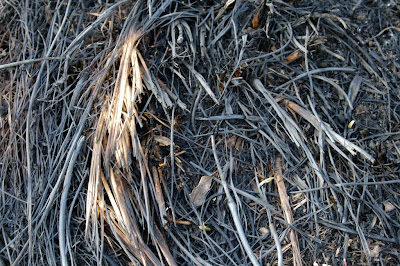
Sometimes I don't pay enough attention to portents. I should know better than this by now, but I don't. Tonight a storm ripped through Gambier--came up from Columbus, the National Weather Service reported, with a history of damaging hail. We had thunder and lightning galore, after an evening of high winds that, I want to believe, are bringing a warm front with them. Already today, in the intervals between downpours, the flowers looked better; the tulips in town are going to make it, I think, and even the newest of the daffodils look as though they'll do all right. Starting to work took considerable effort, but today has been another day of fingers on keys--to produce what Anne Lamott would call a shitty first draft, to be very sure, but to produce, and to produce in a way that has led to some discoveries I did not anticipate: a Henry James story I did not know; a set of notebook entries that will be handy.
But I should perhaps have started packing it in even before the storm hit, and I should certainly have started packing it in before an almost comically disastrous venture to the coffeeshop for a late-night sandwich. But knowing my weaknesses doesn't always keep me from falling into them head-first; I seem to have a penchant for staring my minor ruinations in the face long after there's no storm left, long after the fire has raged through and wrecked its own beauty and left behind it scars and ashes.
At least, I tell myself, I'm the farthest thing from being the only one who should know better. At least what I don't know isn't, as far as I'm aware, damaging anyone else.
Take your triumphs where you find them.

What fullness I'm pulling off these days. It's a luxury I'm finally starting to repay by getting some actual words typed into an actual document stored in the folder on my desktop marked "Book." Other young academics in the house will hear me on this one, I suspect: it feels as though this book has to happen RIGHT NOW. In fact, RIGHT NOW might not be fast enough. And so when I'm not working on it, it takes on mythic proportions. It grows gryphon wings and diamond-tipped talons, a beak of brass and breath of fire, and the last thing I want to do is go canoodle with it in my office. I'd rather be almost anywhere than in the presence of a project I feel should have been done years ago.
But when I gentle myself into it--when, for instance, I pretend that I'm just reading Henry James but then (oops!) discover that I actually need to write some things down and then (oops!) discover that I might want to write those things down in rough draft paragraphs--then the project seems both more manageable and of longer duration than it does in my fevered, driven visions of it. And so it has gone tonight. The only person of whom I can really ask this is myself, but: could someone please remind me to be patient and to trust that I know what I'm doing, after all this time?
Before getting somewhere with my work tonight, though, I got somewhere with another of my arts, first by making the acquaintance of fiber paper in the darkroom as I endeavored to get the print I wanted of my Lexingtonian friend's right arm. (Sweetie, there were seven copies of your right arm floating around by the time I was done.) Fiber paper requires considerably more care than the resin-coated (RC) paper I've been using up until now, and the instant gratification factor is lower. Plastic is easier, plain and simple. But I know fiber's merits: it's archival in a way that RC paper simply isn't. (Sweetie, this means that five copies of your arm will last far, far longer than either of us will.) My prints are now pressed between two of my heaviest photography books, which I'm hoping will keep the paper from curling too badly.
After the darkroom, I found myself reluctant to change gears and sit down at a desk to read. In my world, there's one solution to that kind of reluctance, if I'm hoping to stay in work mode: shoulder a camera and go for a walk. With our temperatures on the way back up and the sun out in blazes today, I decided to pay a visit to the now-burned prairie at the environmental center.

It is a changed landscape, to be sure, and I felt something like a pang to see my green grassed paths gone tawny, my whispering field gone dark and still. But it has its own astonishments to offer. (Is it the worst joke ever that I'm considering making my final photo project a study of grass blades, and calling it Leaves of Grass? What can one expect from a literary critic who's dabbling in the photographic arts?) Before too long, I found myself crawling around on the ground. As it gets even warmer, I may have to go back in truly grubby clothes; things get mighty interesting at ground level. Ethereal, even: the prairie ghosting itself.
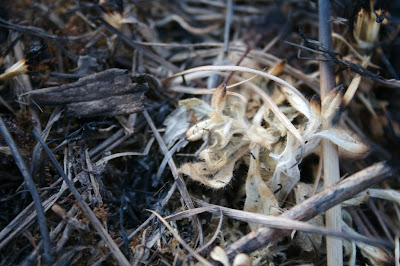
I was a bit surprised that anything remained standing after last week's burn. But I was less surprised at what remains: thorn after thorn after thorn, over and above a sweep of char and huddles.

There's a beauty to it now that seizes me. It is an unforgiving kind of beauty, a sensory difficulty. Putting my hand to the ground to steady myself, I came away with carbon blackening my palm.

It does not need or want my love, this landscape: it's on its own program, spiders webbing their ways through the burnt-over stubble, new shoots spearing through already. There's no softness or pretense here, even where things are at their most delicate.
The project "April 2007."

When I move photographs from my camera to my computer, my photo software tells me that it's importing images into particular projects. Because I'm attempting to become slightly systematic, I'm filing my pictures in projects named for each month. And so it is that Aperture is now toiling away on "the project 'April 2007,'" which seems just about right.
There will be no daunting, I told you confidently last night. Tonight's lesson, perhaps, is that things rarely go completely as planned. This morning, I showed up in the darkroom only to find that the exhaust fans were silent and remained silent no matter what I did to reset the room's power. Without a functioning exhaust system, printing pictures was a no-go. And so it is that I find myself, at the end of the day, wondering how it is that I'm going to have anything to show during Thursday's critique. And so it is that I have a chance to feel myself cleaving to my research once again: it's so clear to me that showing photographs on Thursday is not nearly as important as writing this week. I don't want to choose between art and research, but if forced to choose, I'm smarter than to choose wrong. What's singularly frustrating, though, is the fact that I have some tremendous portraits of my beautiful Lexingtonian friend, and I want to show them off. Fortunately, my photography classmates are not my only audience. And if what I'm after is ego-stroking, I can surely get it in more professionally productive ways than by putting my research off in order to print and mount portraits.
But still, those portraits!
Something possessed me to start reading about Elizabeth Barrett and Robert Browning last night; I think that something is called "a procrastinatory impulse." But it's been a fine stroke of fortune so far. Have I told you this before? Robert Browning's opening lines, in his first letter to Elizabeth Barrett (a famous poet six years his elder, whom he'd never met) on 10 January 1845:
I love your verses with all my heart, dear Miss Barrett--and this is no off-hand complimentary letter that I shall write... Since the day last week when I first read your poems, I quite laugh to remember how I have been turning and turning again in my mind what I should be able to tell you of their effect upon me...By the end of the letter, he's saying more:
in this addressing myself to you--your own self, and for the first time, my feeling rises altogether. I do, as I say, love these books with all my heart--and I love you too.Yes, it is true: when I can mix some swooning into my research, I do it. I am a sentimentalist at heart. I will not lie about it. I have some miserable married people in my book project. It's important for me not to forget the ecstatically married ones.
Taking a break from reading about the Brownings (for the Brownings they became in September 1846), I strolled to the bookstore in the dusk to have a bagel. As I was leaving the officehouse, my dear classicist friend drove by, heading to orchestra practice. I rerouted myself so as to catch up with him briefly and thereby found myself confronting a lovely bush that usually blooms whitely around this time of year (cf. last April 15). Everything is living a different life this April; this unforeseen shock of cold has us all altering the ways we bloom, holding back in some ways, leafing out in others. I find myself in love with the featheriness of these leaves; I find myself begging that these buds will hang on just a few days longer.
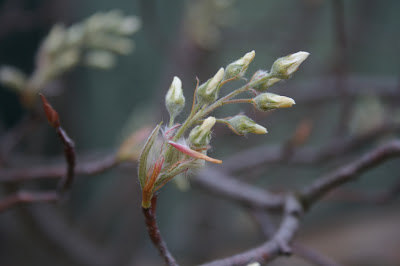
A student stopped to ask what I was doing, peering around at this unassuming plant, and so I showed him what I was by that time trying to chase

and he said, "Wow. I would have walked right past that, if you hadn't been there looking at it." Such, I suppose, is my power.
It's the crabapples I'm worrying about most, because they were so gloriously beautiful last year. Only a few more days, the weather sites tell us, before we're reliably back above freezing. Just hang on a few more days.

The best startle of the night came as I headed back to the officehouse after I'd eaten my bagel. At 8:30, the sky was still light. This, for me, is the blessing of spring. (This, and the fact that I can go out for what I think is going to be an uneventful walk and come back with a camera full of tiny wonders.) Tonight's top image is an experiment in not-focusing. I can't hold a camera still at night anyway, so I figured I'd see what would happen if I aimed for colors and lights, rather than a set of steady outlines. What happened is that I caught the world as it looks to me when I take off my glasses. I'm sort of in love with that one.
Practice resurrection.
Over the course of the weekend, I've been thinking about rebirth and restarting. My seemingly incessant sleeping yesterday carried on into the middle of today: eight hours of sleep on the couch, an hour of wakefulness in bed, three more hours of sleep in bed. And then I finally seemed awake again. Enough of my mystery malaise--otherwise known as the common cold, I think--remained that I begged off on the things that would have forced me to leave the house today and have spent the afternoon and evening padding about in my slippers, finishing some reading, feeling more rested and present than I have for a long time. In the end, then, this weekend seems to have become an occasion for rebuilding resources I have given myself no way of replenishing of late.
Tomorrow, I will start early, will spend the morning hours watching images swimming into being as I swish paper through chemicals. Tomorrow, I will not be moved from my determinations. I will flex my fingers--which by then will smell like stop bath and fix--and will do my best with the materials at my disposal. I will suffer no fools lightly. These things require deliberation and decision. When tomorrow dawns, they'll also require a certain level of sternness with myself, and a capacity to allow in joys that I can't see coming yet.
There's a reason Wendell Berry's "Manifesto: The Mad Farmer Liberation Front" concludes with an exhortation: "Practice resurrection." Resurrection isn't a one-time deal. It's a rising again every single day, a reopening of eyes that (for those of us who are lucky enough to sleep well) have closed and quieted another day's doings. It's a putting one foot after the other back down on the floor, a readying for what is expected and for what cannot be foreseen. And it can be practiced. It must be.
Tomorrow, I will print my prairie, now lying scorched back for growing. Tomorrow, I will print the swelling belly of my friend. Tomorrow, I will do my best to make sense of how others have made books out of their grief. Tomorrow, that is, I will keep on with the work I've been granted. There will be no daunting.
Some days are like this.
I suppose one knows that something might be wrong if one gets up at 10:30 a.m. but then sleeps for four of the next twelve hours. Some sort of fatigue settled over the day from its very beginning, and I didn't much see the point of not succumbing. In the middle of the afternoon, I dreamed something I've now forgotten; when I awoke, I found myself overheated to the point of having kicked off many of my covers. When I got up a few minutes later, I felt woozier than colds usually make me feel--and yet my temperature was still below normal (which, for me, seems to be normal), and so I decided just to get back into bed and stay there until I could no longer. After a celebratory dinner with my excellent friends and my flaming-sworded friend and her husband and one of our poet friends, I made myself horizontal once again, this time on the couch, with all the pillows and a warm blanket.
Feeling this way has made for an excellent reading day. I'm careening through Atwood's Alias Grace, which I can put down when I need to sleep some more and then pick right back up when I float back into wakefulness.
Somehow, despite having slept half the day away, I anticipate no trouble getting to sleep or staying there. And if I get up tomorrow morning having slept twelve hours out of the past eighteen, perhaps the malaise will have moved on. One could say I'm in a kind of stop, drop, and roll maneuver--just without the rolling.
